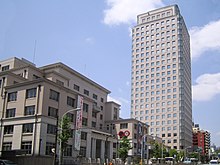Kodansha

Kodansha Limited (株式会社講談社, Kabushiki-gaisha Kōdansha) is the largest Japanese publisher, headquartered in Bunkyo, Tokyo. Kodansha publishes manga magazines Nakayoshi, Afternoon, Weekly Shonen Magazine, as well as more literary magazines such as Gunzō, Shūkan Gendai, and the Japanese dictionary Nihongo Daijiten.
History
Kodansha was started by Seiji Noma in 1909, as a spinoff of the Dai-Nippon Yūbenkai (Greater Japan Oratorical Society). Its first publication was the literary magazine Yūben. The name Kodansha (taken from "Kōdan Club", a now defunct magazine published by the company) was first used in 1911 when the publisher formally merged with the Dai-Nippon Yūbenkai. The company's current legal name has been in use since 1958. Its motto is "Omoshirokute tame ni naru" (To be interesting and beneficial).
The company also owns the Otowa Group, which manages subsidiary companies such as King Records and Kobunsha, and publishes Nikkan Gendai, a daily tabloid. It also has close ties with The Walt Disney Company, and is an official sponsor of Tokyo Disneyland.
It is the largest publisher in Japan, and at one point yearly revenue was more than ¥200 billion. However due to the recent Japanese recession and accompanying downturn in the publishing industry, revenues have been dropping, and the company made a loss in the 2002 financial year, the first time ever since the end of World War II. The second largest publisher, Shogakukan, has been catching up as well – for the 2003 financial year, Kodansha's revenue was ¥167 billion, as compared to Shogakukan's ¥150 billion, a difference of around ¥17 billion; at its peak, Kodansha led Shogakukan by over ¥50 billion.
Kodansha also sponsors the prestigious Kodansha Manga Award, which has run in its current form since 1977 (since 1960 under other names).
Kodansha's Tokyo headquarters are famous in Japanese kendo circles as the home of Noma Dojo, a fencing practice hall, or dōjō, established by Seiji Noma in 1925. The dōjō is the only surviving example of its type and has been described by Japanese media as a "holy place" for kendo enthusiasts and by building preservationists as a priceless example of martial arts architecture. However, Kodansha in November 2007 demolished the hall, replacing it with a practice area in a new corporate building nearby.
Relationship with other companies
The company is a stockholder in various broadcasters across Japan, and is believed to hold around 20% of the TBS Group's stock.[citation needed] It also holds stock in Nippon Cultural Broadcasting, along with Kobunsha. In the recent Nippon Broadcasting System takeover war between Livedoor and Fuji TV, Kodansha supported Fuji TV by selling their stock to them.
Kodansha also has a somewhat contrary relationship with NHK, the national broadcaster. While many of the manga and novels published by Kodansha that have been made into anime, such as Cardcaptor Sakura, have aired in NHK's Eisei Anime Gekijō timeslot, and Kodansha published a companion magazine to the NHK children's show Okāsan to Issho, editorially the two companies often clash. The October 2000 issue of Gendai accused NHK of staging footage used in a news report in 1997 on dynamite fishing in Indonesia. NHK took Kodansha to the Tokyo District Court, where Kodansha was ordered to publish a retraction and pay ¥4 million in damages. Kodansha appealed the decision, and a settlement was reached where Kodansha only had to issue a partial retraction, and pay no damages[1]. This decision, however, has not stopped Gendai's sister magazine Shūkan Gendai from printing articles on further staged footage controversies that have been dogging NHK.
Honors
- Japan Foundation: Japan Foundation Special Prize, 1994.[1]
Publications
- Gunzo, monthly literary magazine
References
See also
External links
- KodanClub - Kodansha's manga information site
- Kodansha International
- Kodansha Japanese website (in Japanese)
